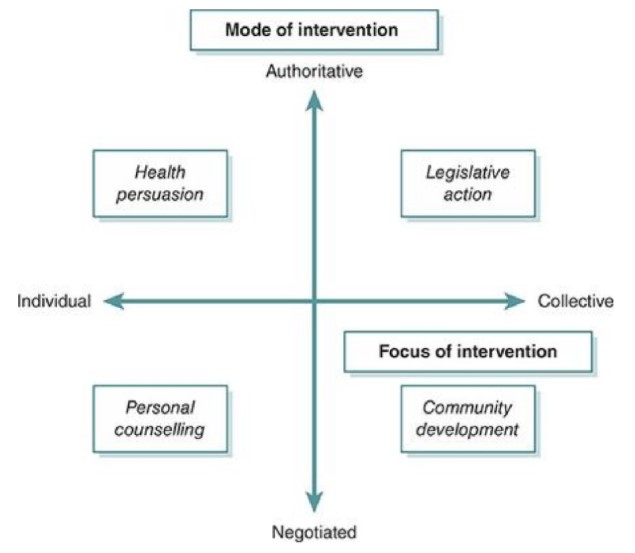What Is Beattie’s Model of Health Promotion
The analysed framework consists of two axes describing various approaches to health promotion in terms of its mode and focus (Peate, 2019). Authoritative practitioners may seek to proactively pursue their vision by changing the legislative status quo at the industry or country level or by targeting individuals in their persuasive attempts. This approach can be presently seen in the ‘soda ban’ initiatives promoted by the governments of many western countries (Siegel, 2019). At the individual level, this pressure can be exerted by direct attacks on specific violators such as anti-vaccine conspiracists spreading misinformation or forgers creating fake COVID-19 vaccination certificates. These coercive measures can be highly effective for getting quick short-term results in crisis situations and removing problems ‘at their source’ via prohibiting dangerous practices and trends.
Figure 1: Beattie’s Model of Health Promotion
Source: Green et al. (2019, p.211)
At the same time, the two lower quadrants of the analysed model can be substantially more effective for reaching more sustainable and large-scope results if the present situation is not critical (Lawrence and Worsley, 2020). At the individual level, such instruments as personal counselling can stimulate a global change of attitudes where individuals accept full responsibility for their health and well-being. For groups, the current community engagement initiatives led by such activists as the Prime Minister of Israel Benjamin Netanyahu have clearly demonstrated their capability to create a country-wide transformation that far exceeds the results obtained through authoritative measures adhered to by the US and EU governments (Kershner, 2021). This approach is generally more positive due to its ‘bottom-up’ nature relying on internal motivation to improve the status quo rather than coercive external initiatives.
How Is this Framework Valuable to Practitioners
Beattie’s model of health promotion is a comprehensive framework covering multiple scenarios of health-related interventions rather than some individual approaches (Nettleton, 2020). This facilitates informed appraisals in both longitudinal and cross-sectional dimensions to identify the best course of action for a particular healthcare system. For example, a country can compare the obtained results with past ones or with the outputs of different countries. This can instantly demonstrate what strategic changes need to be implemented to improve the current course and what mode of intervention may be most effective. Additionally, individual quadrants also suggest the type of actors necessary to implement the selected strategies (professional experts, bureaucrats, consumers or collective negotiators).
How Is It Different from Traditional Behaviour Change Models?
As opposed to similar frameworks such as the Health Promotion Model by Caplan and Holland and the Typology of Health Promotion by French, it is focused on practical implications of health promotion rather than the theoretical analysis of different approaches (O’Neil, 2019). This means that practitioners can instantly appraise the available alternatives within the scope of a particular challenge. However, this also limits the potential effectiveness of the selected measures due to the minimal analysis of culture-specific views of health and subjective beliefs and values associated with it.
If you are stuck with applying Beattie’s Model of Health Promotion to your particular context or case, don’t hesitate to request professional help with essay writing, academic assignments, or a dissertation.
References
Green, J., Cross, R., Woodall, J. and Tones, K. (2019) Health Promotion: Planning & Strategies, London: SAGE.
Kershner, I. (2021) “How Israel Became a World Leader in Vaccinating Against Covid-19”, [online] Available at: https://www.nytimes.com/2021/01/01/world/middleeast/israel-coronavirus-vaccines.html [Accessed on 9 July 2021].
Lawrence, M. and Worsley, T. (2020) Public Health Nutrition: From principles to practice, London: Routledge.
Nettleton, S. (2020) The Sociology of Health and Illness, Hoboken: John Wiley & Sons.
O’Neil, I. (2019) Digital Health Promotion: A Critical Introduction, Hoboken: John Wiley & Sons.
Peate, I. (2019) Learning to Care: The Nurse Associate, New York: Elsevier Health Sciences.
Siegel, B. (2019) Kid Food: The Challenge of Feeding Children in a Highly Processed World, Oxford: Oxford University Press.


